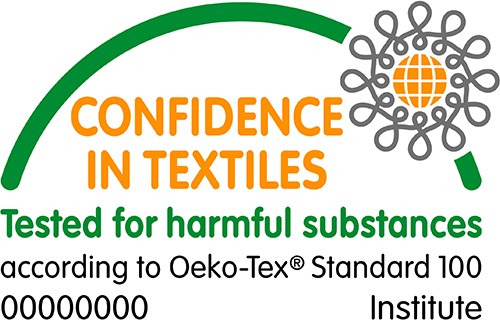Vill du bli uppringd?
Ring på 08-661 12 71 eller
använd kontaktformuläret nedan.
Manufacturing textiles requires a lot of resources in the shape of raw fibre materials, dyes, chemicals, water and energy. There are many stages on the path from fibre to finished textile that can be very taxing for the environment unless carried out correctly. One danger is hazardous substances ending up polluting the waste water or the air, thereby damaging the environment as well as potentially compromising the health of the factory workers in countries where working conditions are poor.

The ecolabel “Bra Miljöval” (“Good environmental choice”) from the Swedish Society for Nature Conservation can help you find the products that inflict the least damage on the environment.
Textiles are a product which requires vast amounts of resources and the manufacturing process is very taxing on the environment because of the large quantities of chemicals and dyes employed in the cultivation and production processes. These substances are very harmful both to our environment and to the textile workers, but they can also affect our personal health when we use the textiles produced. By labelling textiles with the ecolabel “Good Environmental Choice”, we help consumers find the products that are better for our environment as well as our health. As we assess and label these products as an outside independent party, the label is also as a credible way for companies to show that they are authentic in their sustainability work.

Oeko-Tex® is an independent testing and certification system for raw textile materials and intermediate and end-products at all production stages. The following are examples of items eligible for certification: Raw and dyed/finished yarns, raw and dyed/finished fabrics and knits, ready-made articles (all types of clothing, domestic and household textiles, bed linen, terry towelling items, textile toys and more). Oeko-Tex® testing for harmful substances always focuses on the actual use of the textile. The more intense contact a product has with the skin, the stricter the human ecological requirements that have to be met.

Cotton is a renewable natural resource – when we manage to cultivate it in a responsible way. In 2005, a group of visionary organizations met to work out what could be done to secure the future of cotton. “There must be a better way,” they said, and this proved to be the case. It goes under the name of “Better Cotton”.
Better Cotton Initiative (BCI) is a non-profit organisation supervising global standards for Better Cotton, and bringing together the complex supply chain from cotton growers to retailers.
BCI came into existence to improve the global cotton production industry for the people who work in it, for the environment and for the future of the industry by developing Better Cotton as a sustainable, traditional commodity.

Global Organic Textile Standard (GOTS) is a labelling standard for organic textiles. It covers the entire production chain from the harvesting of raw materials to the manufacturing of the final products using environmentally and socially responsible methods. These products must contain a minimum of 95 per cent certified organic natural fibres. Neither GMO fibres nor mixtures of organic and conventional fibres are allowed. The label covers all stages following the harvest, i.e. spinning, knitting, weaving, chemical processing and manufacturing of clothing and domestic textiles, packaging, labelling, exporting, importing and distribution. However, GOTS sets no standards for the cultivation of organic fibre, so growers must be certified according to international or national standards for organic farming. Participants must have a written environmental policy. Waste water must be taken care of and the entire manufacturing process has to be documented.

Business Social Compliance Initiative (BSCI) is proof that participating companies comply with the advanced international requirements of respect for their employees’ rights and health, and that they adhere to ILO conventions and declarations such as the UN guiding principles for business and human rights, as well as to guidelines for businesses on human rights according to the OECD guidelines for multinational enterprises.
The BSCI Code draws on important international labour standards protecting workers’ rights such as International Labour Organization (ILO) conventions and declarations, the United Nations (UN) Guiding Principles on Business and Human Rights as well as guidelines for multinational enterprises of the Organization for Economic Co-operation and Development (OECD).

Fairtrade is an independent certification system that enables farmers and employees to improve their working and living conditions. By choosing a Fairtrade product, you contribute to improved economic conditions for farmers and workers as there are Fairtrade criteria for higher wages and a minimum price which exceeds the cost of production. Together with long-term trade agreements, this provides security for those living on narrow margins.
In addition to higher prices, growers also receive an additional premium which is used to develop their local community socially and economically, maybe by building a new school, new homes and healthcare facilities or by investing it in agriculture. The decision of how to use the premium is taken jointly by the growers.
Fairtrade is not just about getting a better financial situation. The Fairtrade criteria also promote democracy, the right to organise and environmental production considerations while child labour and discrimination are discouraged.

SA8000 is a comprehensive, global, verifiable standard for auditing and certification of social responsibility. It is intended for any company, regardless of size, that wants to show its customers and stakeholders that they care. The standard is based on the belief that workplaces should be managed in such a way that human rights are respected and that the company management is prepared to stand by this and take their responsibility. The initiator of the SA8000 standard was Social Accountability International (SAI). SAI is a non-profit organization that aims to develop, implement and monitor standards in the area of social responsibility.
SA8000 has been constructed in line with the well-known standards ISO 9001 and ISO 14001 for quality and environmental management.